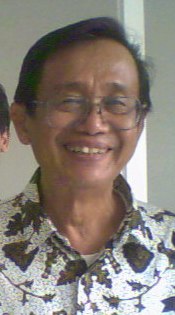Ajip Rosidi facts for kids
Quick facts for kids
Ajip Rosidi
|
|
|---|---|

Ajip Rosidi in 2011
|
|
| Born | 31 January 1938 Majalengka, Dutch East Indies |
| Died | 29 July 2020 (aged 82) Magelang, Indonesia |
| Occupation | Author |
| Nationality | Indonesian |
| Period | 1953–2020 |
| Genre | Literature |
| Spouse |
Fatimah Wirjadibrata
(m. 1955; died 2014)Nani Wijaya
(m. 2017) |
Ajip Rosidi (born January 31, 1938 – died July 29, 2020) was a famous Indonesian writer. He wrote many poems and short stories. By 1983, he had already published 326 works! These appeared in 22 different magazines.
Contents
About Ajip Rosidi
Early Life and Writing
Ajip Rosidi was born on January 31, 1938. His hometown was Jatiwangi, in Majalengka, West Java. He went to school in Jatiwangi and Jakarta.
He started his writing journey very early. At just 12 years old, his first short story was published! It appeared in the children's section of a newspaper called Indonesia Raya. By the time he was 15, his stories were showing up in local magazines. He even earned money for his writing, which was a lot back then.
Two years later, at 17, he released his first book. It was a collection of short stories called Tahun-tahun Kematian (Years of Death). He loved writing so much that he decided to leave high school. He wanted to focus completely on his passion. Around this time, he also attended a lecture by a famous American author, Richard Wright.
A Career in Publishing
Ajip Rosidi's works have been translated into many languages. These include Dutch, Chinese, English, and Japanese. He also translated many biographies himself.
He worked as an editor for several magazines. He helped start a publishing company called Kiwari in 1962. Later, he became the director of other publishing houses. From 1965 to 1967, he founded and led a Sundanese weekly magazine.
In 1968, he suggested creating the Jakarta Arts Council (DKJ). He then served as its chairman for many years. He also led the Association of Sundanese Writers.
Teaching and Later Life
In 1981, Ajip Rosidi became a guest lecturer in Japan. He taught Indonesian language and literature at Osaka University of Foreign Studies. He also taught at other universities in Japan until 1996.
He returned to Indonesia in 2003. In 2004, he became the general manager of a Sundanese-language magazine.
On his 70th birthday in 2008, he released his autobiography. It was titled Hidup Tanpa Ijasah (Living Without a Diploma). In 2011, he received a special honorary doctorate degree. This was for his work in Cultural Studies.
Protecting Culture
Ajip Rosidi worked hard to keep Indonesian cultures alive. He especially focused on Sundanese culture. He wanted people to keep using local languages.
He created the Rancage Literary Award. This award celebrates great writing in Sundanese. He also set up similar awards for works in Javanese and Balinese.
He led a project to research Sundanese folklore. He also wrote an encyclopedia about Sundanese culture in 2000. He encouraged people to study old Sundanese manuscripts. He noted that many of these ancient writings were hard to read.
Ajip Rosidi believed that culture should not be treated like a product to be sold. He felt that culture is very important and should be protected.

